|
|
|
Sort Order |
|
|
|
Items / Page
|
|
|
|
|
|
|
| Srl | Item |
| 1 |
ID:
060480
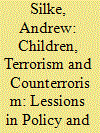

|
|
|
|
|
| Publication |
Jan 2005.
|
| Summary/Abstract |
Children are all too often the victims of terrorist conflicts and, as the Beslan school siege tragically illustrated, this victimisation can be extreme, deliberate and intentional. While all victims of terrorism attract a special interest, child victims unquestionably attract the most. Following this, how terrorist groups and governments initiate and react to violence which kills and maims children can play a major role in how conflicts are perceived and in how campaigns unfold. A failure to appreciate the critical issues surrounding the victimisation of children risks undermining perceived legitimacy, eroding wider support and increasing the backing opponents enjoy. Drawing on a variety of case studies, this article provides a review of how the victimisation of children has impacted in recent terrorist conflicts. Implications for policy and practice are highlighted.
|
|
|
|
|
|
|
|
|
|
|
|
|
|
|
|
| 2 |
ID:
178915
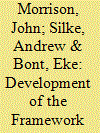

|
|
|
|
|
| Summary/Abstract |
This article introduces readers to the Framework for Research Ethics in Terrorism Studies (FRETS). FRETS has been developed to assist IRB/HREC chairs and reviewers in completing reviews of terrorism studies ethics proposals, in as objective a manner as possible. The framework consists of a series of yes/no questions for chairs and reviewers to answer before completing their reviews. These questions are divided into six different sections: participant’s right’s, safety and vulnerability; informed consent; confidentiality and anonymity; researcher’s right’s, safety and vulnerability; data storage and security-sensitive materials; and the ethical review process. This framework was developed as a result of critical analysis of the literature in terrorism research and analogous fields.
|
|
|
|
|
|
|
|
|
|
|
|
|
|
|
|
| 3 |
ID:
021729


|
|
|
|
|
| Publication |
2001.
|
| Description |
1-14
|
|
|
|
|
|
|
|
|
|
|
|
|
|
|
|
| 4 |
ID:
053268


|
|
|
| 5 |
ID:
148909
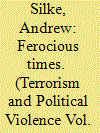

|
|
|
|
|
| Summary/Abstract |
The 1916 Rising was, in military terms, a shambolic failure. Despite the fact that Britain was locked in a gruelling struggle with Germany, the Rising was still utterly crushed within a week. How then, in the aftermath of victory against Germany, did Britain fail to win the subsequent struggle with the Irish Republican Army (IRA) between 1919 and 1921? This article assesses some of the key factors that played out in the conflict, drawing particular attention to the IRA's focus on the Royal Irish Constabulary and the consequences of this, and then later, how distorted perceptions of the proximity of success ultimately undermined British commitment. One of the most remarkable features of the conflict was the widespread belief among many on the British side (and more than a few in the Republican camp) that the IRA was on the verge of total defeat when the truce was declared in 1921. The IRA had suffered heavy casualties and were running low on weapons and ammunition. Yet, somehow the movement prevailed. This article aims to shed light on how and why that happened.
|
|
|
|
|
|
|
|
|
|
|
|
|
|
|
|
| 6 |
ID:
188057


|
|
|
|
|
| Summary/Abstract |
Climate change is a potential major driver of future terrorism. It is already recognised by many (if not most) nations as a strategic security threat, though the potential role it can play in igniting, facilitating, or exacerbating terrorist conflict has been relatively unexplored. There are, however, growing signs that climate change—either through direct or indirect impacts—should be considered as a significant macro-level driver of terrorism. It is certainly well established that the causes of terrorism can involve both large-scale geo-political processes and at the same time much more low-key individual level personal factors. Much of the traditional debate around the “root causes” of terrorism has concentrated heavily on macro-level drivers with a particular focus on factors tied to economic, political and historical forces.1 The relative importance of each factor can vary enormously depending on the perspective taken not only in research terms but also in terms of potential policy interventions. It is critical to acknowledge, however, that not all causes will be present in every case, and those that are present do not always have the same degree of impact. A cause of vital importance in one terrorist conflict might play no detectable role in others.
|
|
|
|
|
|
|
|
|
|
|
|
|
|
|
|
| 7 |
ID:
156900
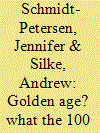

|
|
|
|
|
| Summary/Abstract |
In a context where widespread failings in the nature of terrorism research are well recognised—yet where the quantity of work is still enormous—is it possible to fairly assess whether the field is progressing or if it has become mired in mediocre research? Citation analysis is widely used to reveal the evolution and extent of progress in fields of study and to provide valuable insight into major trends and achievements. This study identifies and analyses the current 100 most cited journal articles in terrorism studies. A search was performed using Google Scholar for peer-reviewed journal articles on subjects related to terrorism and counter-terrorism. The most cited articles were published across sixty-two journals, which reflected the interdisciplinary nature of terrorism studies. Compared to other articles, the most cited articles were more likely to be the result of collaborative research and were also more likely to provide new data. Sixty-three of the top 100 articles have been published since 2001. The findings are discussed in relation to the evolution of terrorism research and current debates on progress in the field.
|
|
|
|
|
|
|
|
|
|
|
|
|
|
|
|
| 8 |
ID:
068301
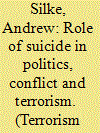

|
|
|
| 9 |
ID:
071353


|
|
|
|
|
| Publication |
Chichester, John Wiley, 2003.
|
| Description |
xxi, 277p.
|
| Standard Number |
0471494623
|
|
|
|
|
|
|
|
|
|
|
|
Copies: C:1/I:0,R:0,Q:0
Circulation
| Accession# | Call# | Current Location | Status | Policy | Location |
| 051194 | 155.935/SIL 051194 | Main | On Shelf | General | |
|
|
|
|
|
|
|
|
|